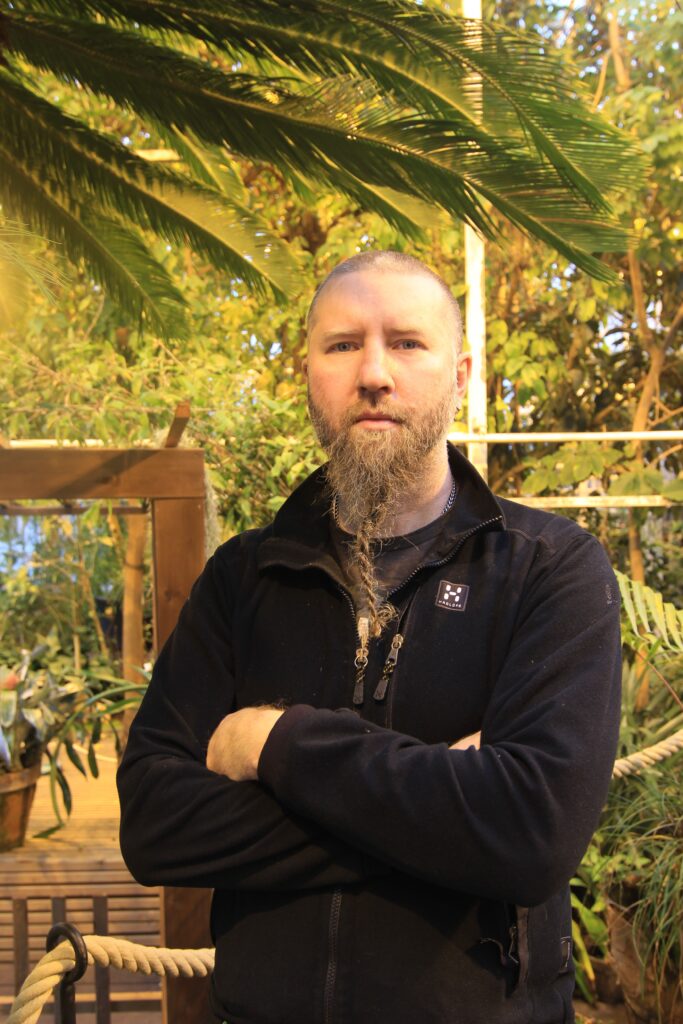Botania started as the botanical garden of the University of Eastern Finland in 1985. Later, when the university chose to close it down, it was adopted by Botanian ystävät Ry, before its current sole owner Kari Kola purchased it in 2018. Kola rebranded Botania as an event garden. On top of the serene in- and outdoor gardens that together contain nearly 3000 species of plants and a host of exotic butterflies, Botania hosts live music performances, light art events and more.
A small tour and a short photoshoot later, I sat down with Tuomo Lehikoinen. Originally, Lehikoinen was hired as a restaurant manager, but he also manages most clients, handles some of the company’s recruitment and helps coordinate international events held at Botania, among other day-to-day affairs.
Botania could easily be considered one of the cornerstones of Joensuu’s cultural life. Located just a stone’s throw away from the university campus, Botania is a popular meeting spot. Pandemic notwithstanding, Botania has hosted many international performers. The most recent event to-be was Irish Fling, which unfortunately had to be cancelled due to the present circumstances. Nevertheless, the annual Visual Fest will still be held this November, and in the meantime Botania chugs along as usual – all this with a remarkably small team, no less.
“We have a pretty small team that’s close-knit. It’s very nice to work here, and we aspire to ensure that the personnel work to their fullest. A small group can’t tolerate a lot of resistance. The going must be good, and we strive to make sure that everyone feels good at work.”
Tuomo Lehikoinen, Botania
What Botania lacks in size, it makes up for with cultural diversity. Both Botania and its owner Kari Kola – who is a world-renowned light artist – enjoy widespread international recognition. Not only that, but Botania also employs multiple different nationalities.
“Our working language here is English. Right now, we have one employee from the Czech Republic. We’ve had employees from Russia, and our last gardener was from England. It’s a pretty international team for one so small.”
The size of the team has other advantages as well. There is no need for a strong hierarchy in a small organization, and the employees have clear job descriptions. According to Lehikoinen, the going has been easy, people are not afraid to be open and Botania’s international employees have integrated without dilemmas.

Even with the pandemic, Botania received plenty of foreign visitors from Europe over the course of the summer, and once the travel restrictions on the Eastern border are lifted, he expects there to be plenty of Russian visitors again. The goal of the company is to gain more visitors and international recognition, and so new international hires are likely on the horizon.
As for why Lehikoinen thinks businesses should hire more international talent, he offers the tried and true explanation. The native population is getting older. He does not stop there, however. Multiculturalism enriches the business, and is simply a major practical help in communication as well as marketing.
“People from different backgrounds are a blessing, whether they come from Finland or elsewhere. Multiculturalism is wealth in everyday life too.” When asked, international hires have led to new business contacts, Lehikoinen estimates that they have. “Surely, yes. That way, for example, we can do marketing in languages other than just Finnish or English.”
Kola himself, previously busy with other obligations, chimes in with comments of his own. International talents bring with them new points of view. In a way, multiculturalism can act like a mirror.
“Sometimes you don’t see the forest for the trees. We have a lot of good things, and you don’t necessarily always notice that.”
Text: Lauri Vuori
